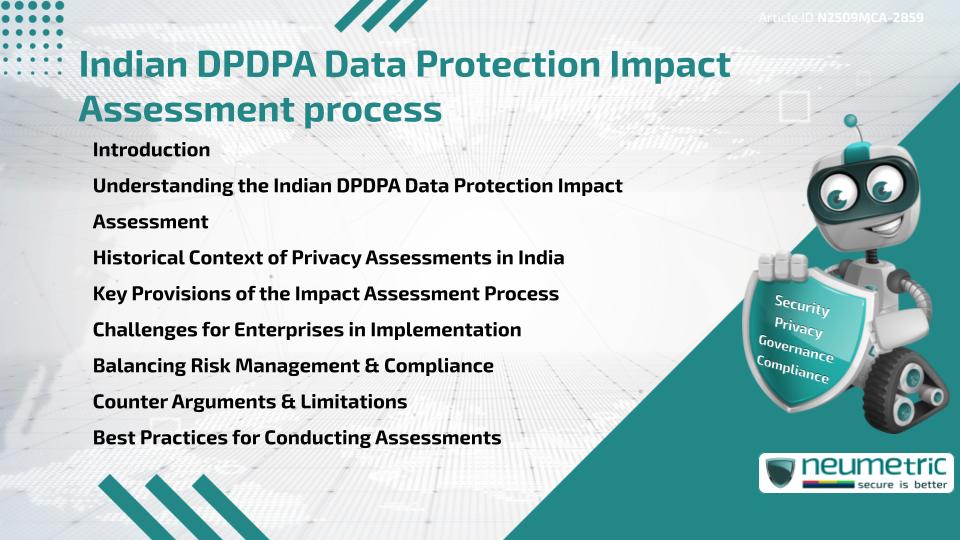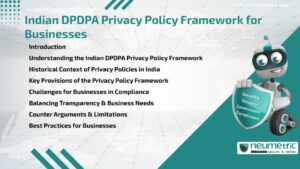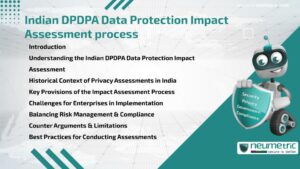Table of Contents
ToggleIntroduction
The Indian DPDPA Data Protection Impact Assessment [DPIA] process is a Compliance requirement under the Digital Personal Data Protection Act [DPDPA]. It ensures that Enterprises evaluate the Risks of handling Personal Data before launching certain High Risk Projects. The process aims to Safeguard Individual Privacy, Minimize Harm & Create Accountability. This article explores the Concept, Legal Framework, Challenges & Best Practices surrounding the Indian DPDPA Data Protection Impact Assessment.
Understanding the Indian DPDPA Data Protection Impact Assessment
A DPIA is a Structured process that helps Enterprises identify Risks to Personal Data & Implement safeguards before processing begins. Under the Indian DPDPA Data Protection Impact Assessment Rules, Enterprises must conduct such Assessments when their Data handling activities are likely to cause significant Privacy Risks, such as processing Sensitive Data or Large-scale Profiling.
Historical Context of Privacy Assessments in India
Before the DPDPA, India had no mandatory Framework requiring Enterprises to carry out Risk-based Assessments for Data processing. The introduction of DPIAs was influenced by global Best Practices, particularly the European Union’s General Data Protection Regulation [GDPR], which mandates similar Assessments. The DPDPA adopts this approach to align India with International Privacy Standards.
Key Provisions of the Impact Assessment Process
Enterprises must:
- Identify Processing activities that pose high Privacy Risks.
- Assess the necessity & proportionality of such activities.
- Document Potential Risks to Data Principals.
- Propose Safeguards, Controls & Accountability measures.
- Submit the Assessment to the Data Protection Board if required.
These provisions ensure that Risks are evaluated Systematically before Data Processing begins.
Challenges for Enterprises in Implementation
Carrying out the Indian DPDPA Data Protection Impact Assessment can be demanding. Common challenges include:
- Limited expertise in conducting Structured Risk Assessments.
- Difficulty in defining what Qualifies as “High Risk.”
- Increased Compliance costs, especially for Small Businesses.
- Aligning Assessments with Sector-specific Regulatory needs.
Balancing Risk Management & Compliance
The DPIA process is not merely a Legal formality but a Oractical Risk Management Tool. Enterprises must use it to weigh Business Objectives against Privacy Concerns. For example, a Fintech Company Processing Biometric Data must evaluate whether strong Encryption & Access Controls adequately mitigate Risks. This balance helps build trust with Customers & Regulators alike.
Counter Arguments & Limitations
Critics argue that mandatory Assessments may slow down innovation & burden smaller Enterprises. Another limitation is the absence of detailed sectoral guidance, which may cause inconsistent application of the DPIA Process across Industries.
Best Practices for Conducting Assessments
Enterprises can improve Compliance by:
- Integrating DPIAs into Project Planning Phases.
- Using Standardised Templates & Risk Assessment Frameworks.
- Involving Cross-functional Teams, including Legal, IT & Compliance.
- Reviewing Assessments regularly as Business Processes evolve.
Conclusion
The Indian DPDPA Data Protection Impact Assessment Process enhances Accountability & Safeguards Individual Rights. By embedding Risk evaluation into their Operations, Enterprises can ensure Compliance, reduce Privacy Risks & Build stronger Trust with Stakeholders.
Takeaways
- The Indian DPDPA Data Protection Impact Assessment is mandatory for High Risk Data Processing.
- It requires Risk Identification, Safeguards & Accountability measures.
- Enterprises face challenges in Expertise, Costs & Sector-specific clarity.
- Best Practices include early Integration, Standardization & Regular Reviews.
FAQ
What is the Indian DPDPA Data Protection Impact Assessment?
It is a Structured Process requiring Enterprises to evaluate Privacy Risks before undertaking High Risk Data Processing.
When is a DPIA required under the DPDPA?
It is required when Enterprises process Sensitive Data or Engage in Large-scale Profiling that could significantly Impact Privacy.
Who conducts the DPIA within an Enterprise?
Typically, a Compliance or Data Protection officer leads the process with Inputs from Legal, IT & Operational teams.
Does a DPIA need to be submitted to Regulators?
Yes, in some cases the Assessment must be shared with the Data Protection Board for review.
What challenges do Enterprises face in implementing DPIAs?
They often lack expertise, face higher costs & struggle with defining what constitutes High Risk Processing.
Can small Enterprises be exempt from DPIAs?
The law does not grant Blanket Exemptions, but smaller Enterprises may face fewer obligations depending on the scale of Data processing.
References
- Digital Personal Data Protection Act – Ministry of Electronics & Information Technology
- India’s Data Protection Law Overview – Internet Society
- General Data Protection Regulation – European Commission
- Data Protection Impact Assessments – UK Information Commissioner’s Office
- OECD Guidelines on Privacy & Data Flows
Need help for Security, Privacy, Governance & VAPT?
Neumetric provides organisations the necessary help to achieve their CyberSecurity, Compliance, Governance, Privacy, Certifications & Pentesting needs.
Organisations & Businesses, specifically those which provide SaaS & AI Solutions in the Fintech, BFSI & other regulated sectors, usually need a CyberSecurity Partner for meeting & maintaining the ongoing Security & Privacy needs & requirements of their Enterprise Clients & Privacy conscious Customers.
SOC 2, ISO 27001, ISO 42001, NIST, HIPAA, HECVAT, EU GDPR are some of the Frameworks that are served by Fusion – a SaaS, multimodular, multitenant, centralised, automated, CyberSecurity & Compliance Management system.
Neumetric also provides Expert Services for technical Security which covers VAPT for Web Applications, APIs, iOS & Android Mobile Apps, Security Testing for AWS & other Cloud Environments & Cloud Infrastructure & other similar scopes.
Reach out to us by Email or filling out the Contact Form…





